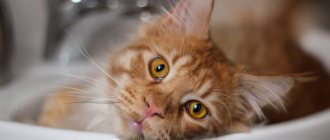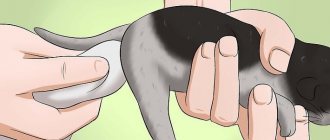A new family member is a big responsibility. Even before worries regarding maintenance and care, the future owner will have to make a difficult choice in favor of the place of purchase, the gender and age of the animal. To make a decision, you will have to analyze your requirements and capabilities and then decide how to choose the right kitten and how to care for it.
Vaccination
The chance of getting a healthy kitten increases if the chosen baby has already been vaccinated against infectious diseases.
The need for vaccination. Preventive vaccinations are necessary for cats even if they do not leave the apartment. The owner or family guests can bring the infection from the street, and the disease can be quite serious.
Veterinarians recommend vaccinating kittens against:
- panleukopenia;
- rhinotracheitis;
- parvovirus;
- calcivirosis;
- rabies.
Both purebred and outbred animals are subject to vaccination.
The first vaccination is given to a kitten at the age of 8-9 weeks, and after 3-4 weeks a revaccination is carried out.
Also watch the video on how to choose a healthy kitten:
Useful tips
It is clear that you can carry out all these activities only when purchasing a baby from breeders or in a pet store. When buying a kitten secondhand at the market, or picking it up from the street, you are unlikely to be able to test its psychological and behavioral skills. But you can definitely evaluate the appearance, and this is no less.
If the kitten already has a veterinary passport, then carefully study it. There are often cases when unscrupulous breeders simply put up vaccination stickers, but do not do them.
Opposite the vaccination there must be a stamp and signature of the veterinarian. And further. Exchange phone numbers with the seller so that if something happens you can call and solve the problem.
Some sources recommend meeting the kitten's parents. It is advised to evaluate the appearance of the cat and other signs. But often reality makes its own adjustments. For example, the owners of a cat are selling their child with child support - and you won’t see the cat. Or you generally buy a kitten not from a nursery, but from someone else. Where will the owners get your furry's unknown father?
Try not to buy an expensive purebred kitten on the market or secondhand. Most likely he will turn out to be an ordinary “noble” breed. It is clear that this will not make you love him less. But it’s still not worth helping scammers with money.
How to choose a healthy kitten? For several reasons. Then the fluffy little ball will bring only joy to the house. Of course, if the animal turns out to be sick, this is not a reason to throw it out into the street. Remember how much fame world-famous cats and cats with mutations and diseases brought to their owners. For example, everyone knows a sad cat with an offended expression on its face.
But, if there is an opportunity to insure yourself, then why not take advantage of it? Healthy and cheerful babies to you!
how to stop a kitten from biting and scratching
Appearance
Therefore we consider:
- Wool (if any). Smooth, clean, with a healthy shine. No tangles or bald spots.
- Leather. Pink or gray depending on the color. Smooth, velvety, soft. No wounds, scratches or rashes. Small scratches are allowed on the neck, just below the back of the head - this is the mother cat still dragging the kitten by the scruff of the neck in her teeth.
- Ears. Clean, without sebaceous accumulations, dirt and black (sometimes brown) spots. Shouldn't smell bad.
- Nose. Damp and cold, but not very wet (as if there were snot).
- Eyes. Shiny, transparent, without cloudy haze. Absence of suppuration and tear streaks. In breeds with a deep bridge of the nose, drips are allowed; this is their feature.
- Place under the tail. Clean and dry, without stains or pellets on the coat.
- Skeleton. Strong, dense. Paws and tail without curvature. No lameness.
- Teeth and gums. Pink color, without spots or wounds. If there are no teeth yet, then the baby cannot be taken away. He's too small.
I recommend: Rare cat breeds: TOP 19
These are the main external signs by which you can easily determine whether a kitten is healthy or already sick.
Advice. Be sure to touch the tummy of the chosen kitten. It shouldn't be swollen like a ball. Or vice versa, sunken. These are not direct signs of the disease, but they are already a reason to think about it.
Psychological condition
This is a very interesting sign. They say that you can use it to find an animal that is ideally compatible with you. How to choose a kitten? Just watch.
Advice. Touch the kitten's paws. A healthy kitten will try to pull them out or start playing with you. The patient will not do this. But this is not the ultimate truth. It is possible that the fluffy just woke up. And yes, there are melancholic people among cats too.
Temperament
Animals also differ in their disposition. It is a common belief that cats gradually adopt the behavior of their owners and become similar to them. At the same time, purebred pets also have natural character traits. It has been established that Siamese breeds are evil and vindictive from birth. In contrast, Persians are distinguished by kindness and lack of irritability.
The atmosphere in the house and habitat play an important role in shaping a pet’s character. For example, pets sleep much more than their street relatives. Among other things, it is generally accepted that large cat species have greater endurance than small breeds.
If you find an error, please select a piece of text and press Ctrl+Enter.
Share:
Where to take a baby: all the pros and cons
None of the available locations are ideal. The final choice is made individually depending on your goals and wishes.
P nursery
The only disadvantage of the nursery is the high prices. Not everyone is ready to spend a lot of money, so they prefer more affordable options.
Shelter
Market
For private individuals
From the street
Stray kittens are often infected. This is dangerous for other pets and humans. Visit your veterinarian before bringing your foundling into your home.
At first, you will have to monitor the amount of food you eat: a baby and even an adult cat will eat everything they give him. Without strict control, overeating and subsequent digestive problems cannot be avoided.
Toilet training is no less difficult. It is recommended to take a vacation during the adaptation period - this way you can monitor the behavior of the new family member and quickly let him get used to you.
Oddly enough, cats know how to be grateful for being saved. Like dogs, they remember the kindness of their owner for the rest of their lives - especially if they were adopted as adults.
How to determine the gender and breed of your pet
The gender of the future pet plays a big role. It affects care habits, behavior and character. Girls have the following characteristics:
- more flexible and good-natured character;
- smaller sizes and less impressive appearance;
- increased cleanliness;
- the presence of estrus, obliging you to put up with mating songs or carry out sterilization.
Cats are more vulnerable to cancer, so the only salvation is timely sterilization. This operation is more complicated than castration of a cat, so its price will be higher. In turn, males differ:
- impressive shapes and attractive appearance (especially purebred individuals);
- instinct of marking territory during the period of sexual hunting;
- love of freedom, arrogance and laziness;
- stronger smell of stool;
- predisposition to urolithiasis.
All of the above features are individual. Cats are also often playful, clean and loving, but a cat can show a difficult character. And if a kitten and a young individual tend to show isolation, then more mature animals, regardless of gender, become increasingly attached to people.
A more obvious pattern can be seen among breeds. Some are phlegmatic, while others resemble a perpetual motion machine. All this will also have to be taken into account. First, describe your family:
- Hard-working. For workaholics, self-sufficient breeds that can entertain themselves on their own are suitable: Russian Blues, Bombays, American Shorthairs. They easily tolerate loneliness without becoming depressed.
- Active. For energetic owners with enough free time, Angoras, Siberians and Maine Coons are suitable - those cats that they love to walk.
- There are children or elderly people. Britons and Ragdolls get along well with small children. Their angelic patience is amazing. Pensioners should recommend calm Persians or talkative Siamese.
If you are allergic to wool, choose a hypoallergenic breed. These include the Sphynx, Cornish and Devon Rex. Due to the lack of fur, sphinxes and rexes love to bask on their master's lap and caress people.
There are exceptions - when the dander of a hairless cat (and they do have it) causes allergies more strongly than fur. Then it’s worth taking a closer look at other breeds - oddly enough, long-haired Siberian cats are included in the group with the lowest level of allergen.
Kitten care
Before purchasing, make sure you can handle raising a new family member. In addition to feeding, playing and grooming, you will have to take care of regular trips to the veterinarian.
What will your baby need?
Purchase two bowls in advance - for food and water. It is safer to buy ceramic or metal products, since they will not turn over or move, and they are easier to wash than plastic ones.
I recommend: Hairless cat breeds: types and names
In addition to the tray and filler, be sure to take diapers. Be patient while your cat gets used to the litter box, and don't scold him if he makes mistakes.
To sharpen claws, it is better to choose 2 options: horizontal and vertical claws. You can only find out which of these your pet prefers after the fact.
Maintenance cost per month
Monthly expenses are individual, as it all depends on the preferred brands of food and the prestige of the chosen veterinary clinic.
Sometimes costs may increase. This happens during planned visits to the veterinarian, sterilization and treatment of the disease. The pet must also be treated quarterly for worms. Pets that roam outside will need a flea collar.
Health of a new family member
Never bring animals home from the street until examined at a veterinary clinic. This is dangerous for other pets and even people. Only cats adopted from a cattery or acquired through good friends do not need a doctor.
Regardless of breed, do not forget about deworming and annual vaccination. Mestizos are no less vulnerable to infections, so compliance with the vaccination schedule is the direct responsibility of each owner.
Once you figure out how to choose a cat, making a decision becomes much easier. Based on your financial capabilities, availability of free time and preferences for appearance and character.
The article is for informational purposes only. Contact a specialist!
Let fellow pet lovers know what you think.
What determines the cost of kittens?
Officially, purebred kittens are divided into three categories:
- Pat (Pet);
- Breeding;
- Show class (Show).
Show class – the best representatives of the breed, potential exhibition winners and valuable genetic material. These kittens are the most expensive. Taking such a pet for castration is unwise from a financial point of view and sad for the gene pool of the breed.
Most often, kittens of the breeding class are sold - a strong middle class. These cats can participate in breeding because they have no obvious defects and have all the breed qualities.
The kitten must have a pedigree (4 generations), regardless of what class it belongs to.
Don’t rush to buy a purebred baby at an attractively low price “without documents”, “unscheduled mating”. Most likely, such breeders want money, not improvement of the breed.
I recommend: How to choose a cat
A cat should not have more than 3 litters per year, while home-grown breeders give birth to kittens at 1-2 months and receive litters from the female 4-5 times a year. Such babies cannot be strong and healthy and often suffer from rickets.
Buying a kitten cannot be an “urgent” matter. It’s better to wait a few months “in line” at a good cattery than to take just any kitten.
At what age should you take a kitten home?
Only unscrupulous breeders give away 1.5-month-old kittens. We should not forget that such babies can die from panleukopenia, while children and adults will already become attached to the new pet.
Although 3-month-old kittens no longer need their mother's milk, they learn a lot from an adult cat and from playing with their relatives. At 3 months, the cub is already accustomed to using the tray and eating food; he does not have to be babysat all day long.
In order not to buy a pig in a poke...
Age is important! It is not recommended to adopt a newborn kitten. Some believe that even at 3 months he is not yet ready for independent life. In any case, the kitten must be 2 months old at the time of purchase. You can’t suddenly change your diet in a new place. You need to listen to the advice of breeders regarding food, find out which products are suitable as complementary foods. If it is not possible to purchase what the animal is accustomed to, there is always an alternative.
Find out if the kitten has been trained to use a tray and scratching post. Often, unscrupulous sellers claim that the kitten will not be able to live without a tray, but in reality, unpleasant surprises await you. You will have to teach the kitten.
The organs of vision, hearing and touch must be clean, without pathologies or secretions. A healthy cat has a clean mouth with pink gums and straight teeth, and the fur is shiny and glossy.
You need to make sure whether the animal has been treated for fleas and worms, and whether the kitten has been vaccinated. The first vaccination is given at 8–12 weeks of age. Information about the date and name of the drug is included in the registered veterinary passport. In addition, you will find out the address of the veterinarian.
It's good if the kitten responds to its name. If not, pick up derivative and easy-to-pronounce pet names and begin to develop a conditioned reflex. An affectionate and fluffy pet will bring a good mood and positivity into your home.
Why is it important not to make a mistake when choosing a kitten?
Some people approach choosing a pet much more simply. What difference does it make - a boy or a girl, British or Siamese, bald or furry? After all, all kittens are adorable! And if they are all so cute, take any - you won’t go wrong.
But the charming baby grows up quickly, and turns out to be completely different from what his owner wants him to be. Behavior during sexual hunting in both male and female cats comes as a surprise to people. But a kitten is not a toy that can be thrown away.
It also happens: red-haired happiness breaks into the house itself
To decide which kitten is better to adopt:
Let your pet please you with good health and a pleasant character. Surround your baby with care, and any kitten will respond to you with sincere affection.
Coat color and character of the cat
There is a direct connection between the color of a cat's fur and its disposition. For example, black animals are considered to be very curious and independent. Black and white pets are usually sociable, talkative and loyal to their owners. Animals with tiger colors or stripes do not tolerate violation of their territory. These cats are a little wild. Red pets love the comfort and warmth of a homely atmosphere. They don't like to rush, and are very kind to people. White cats are considered finicky and easily offended.











